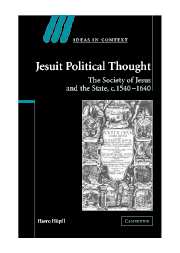Book contents
- Front Matter
- Contents
- Acknowledgements
- List of abbreviations
- Translations, references, and orthography
- Introduction
- 1 The character of the Society of Jesus
- 2 The Society's organisational ideas
- 3 The Society and political matters
- 4 The Church, the Society, and heresy
- 5 The confrontation with reason of state
- 6 Reason of state and religious uniformity
- 7 Jesuit reason of state and fides
- 8 Reason of state, prudence, and the academic curriculum
- 9 The theory of political authority
- 10 Limited government, compacts, and states of nature
- 11 The theory of law
- 12 The common good and individual rights
- 13 Tyrannicide, the Oath of Allegiance controversy, and the assassination of Henri IV
- 14 The papal potestas indirecta
- Conclusion
- Bibliography
- Index
- IDEAS IN CONTEXT
4 - The Church, the Society, and heresy
Published online by Cambridge University Press: 22 September 2009
- Front Matter
- Contents
- Acknowledgements
- List of abbreviations
- Translations, references, and orthography
- Introduction
- 1 The character of the Society of Jesus
- 2 The Society's organisational ideas
- 3 The Society and political matters
- 4 The Church, the Society, and heresy
- 5 The confrontation with reason of state
- 6 Reason of state and religious uniformity
- 7 Jesuit reason of state and fides
- 8 Reason of state, prudence, and the academic curriculum
- 9 The theory of political authority
- 10 Limited government, compacts, and states of nature
- 11 The theory of law
- 12 The common good and individual rights
- 13 Tyrannicide, the Oath of Allegiance controversy, and the assassination of Henri IV
- 14 The papal potestas indirecta
- Conclusion
- Bibliography
- Index
- IDEAS IN CONTEXT
Summary
The Society's characterisation of heresy and the responses that it advocated both fitted seamlessly with its convictions concerning good order. The Society was not founded for the sake of combating heresy, and had far more tasks than it could cope with even where there were no heretics. But the opinion that it had been established, and indeed providentially intended, precisely for this purpose rapidly became a commonplace in the Society itself; on occasion even Ignatius said something of the sort. An extremely hard-line Jesuit orthodoxy about heresy and heretics developed effortlessly. Of the founders, only Pierre Favre seems to have been at all generous in his attitude. Dealing with the ‘heretical’ enemies of the Church became one of the Society's salient activities and it led inevitably to a preoccupation with politica. For heresy was the foremost among many matters which escaped the ‘temporal/spiritual’ and ‘civil/ecclesiastical’ dichotemisations.
THE NATURE OF HERESY
In their controversialist writings and treatises, Jesuits relied on traditional definitions such as that of the Dominican Alonso à Castro, whose On the Just Punishment of Heretics was as standard a reference work on heresy for Jesuits as Martin de Azpilcueta (Navarrus)'s Manual was for casuistry. Castro's definition reads: ‘A heresy is an assertive, false declaration or proposition which is so contrary to the Catholic faith that it cannot be reconciled with it.’
This definition focussed on the doctrinal aspect of heresy. So did the vast expanse of paper Jesuits devoted to controversies with the ‘heretics’.
- Type
- Chapter
- Information
- Jesuit Political ThoughtThe Society of Jesus and the State, c.1540–1630, pp. 64 - 83Publisher: Cambridge University PressPrint publication year: 2004



